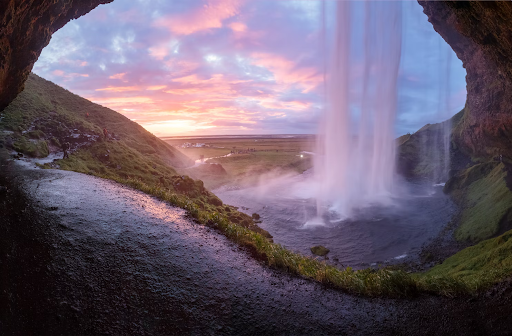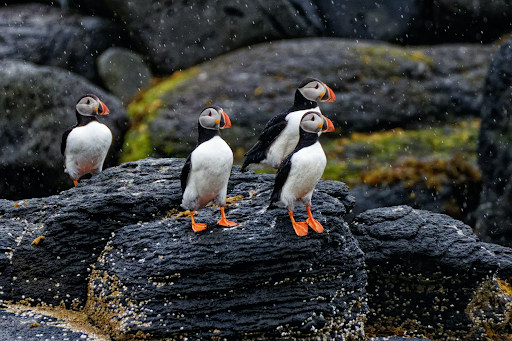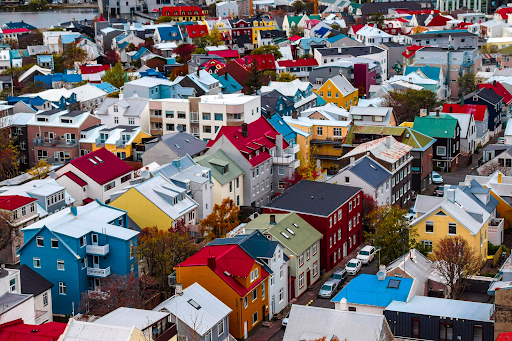Fun Facts About Iceland
Iceland is a wonderful nation that captivates just about everyone who is lucky enough to visit. The island is a wonderfully quirky place, with interesting people, unparalleled scenery and plenty of wonderful things to experience. Iceland is also a unique country, and in some ways, quite unusual and different. We’ve put together some top facts about Iceland so that you can learn more about the country.
Informative Iceland Facts
Here you’ll find a few brief facts about Iceland’s location, landmass, cities, and currency. While not as unusual as some other aspects of this country, these facts are still important to know if anything is to be learnt of Iceland.
- Iceland has the lowest population density on the continent. The population of Iceland is 345,392, with the lowest population density in all of Europe with just 3 people per kilometre across the country. Harsh geographical landscapes contribute to this low number.
- The capital of Iceland is Reykjavik. Reykjavik is the largest city in the country, located in Faxa Bay. With vibrant nightlife and fascinating attractions, Reykjavik is a must-see on your Iceland itinerary.
- Iceland uses the Icelandic Krone (ISK) as the national currency. This is the most widely used currency, though you can use Mastercard and Visa credit cards in the more touristy areas of the country.
- Iceland is not in the European Union. Despite popular belief, Iceland is not a member of the EU, despite applying for membership in 2008. It is involved in the European Economic Area as well as the Schengen Agreement and has many other modern European influences.
- Icelandic is the official national language in Iceland. This Germanic language is notoriously difficult to learn and pronounce for non-natives, with little change since the settlement of Iceland in the 9th century. There are around 314,000 speakers, most of whom live in Iceland. However, English is also widely spoken by Icelanders.
Iceland Facts for Visitors
Like in any country, it takes time to get to know a place before truly enjoying it in all of its glory. Here are some simple tips for when you visit Iceland, to remember during your trip.
- Iceland is no longer in lockdown. In fact, Iceland has now lifted all domestic restrictions combatting COVID-19. From 25th February 2022, there are no longer social distancing or mask measures in place in Iceland.
- It’s illegal to park on the road and take photos. Many people are inspired to take photos when driving around Iceland - and who can believe them? The scenery is literally stunning. But, because it’s not safe to just stop your car in any old place, drivers are required to find a designated stopping or parking area when they want to stop and take photos.
- Beer was once illegal in Iceland. In 1915, this ban was imposed to try to dissuade younger people from heavy drinking - this ban, which lasted nearly 75 years, has long since been lifted.
- In Icelandic Summer, the sun will barely set in the sky for longer than a few hours. This phenomenon is known as the midnight sun and means that sleeping can be difficult for those not used to the light in the sky. Remember to bring an eye mask if you are a light sleeper.
- Paying with a card is the norm. Don’t worry too much about getting lots of Icelandic Krona cash out, paying by card is accepted in encouraged in most shops and restaurants.

Iceland’s Geography Facts
The landscapes of Iceland truly are something to behold. Visitors to the island nation are always overcome by the sight of the many mountains, waterfalls, lava fields and more, all a result of the country’s volcanic past - and present!
- Iceland isn’t as cold as its reputation may suggest. The coldest month of the year is January, when the low averages about 29F. That’s only just below freezing, and many other places get much colder!
- You can see between tectonic plates in Iceland. Iceland is one of only 2 places in the world where you can see the separation between two tectonic plates on the earth’s surface. At Thingvellir National Park you can see this wonder quite easily, it’s even possible to join a tour and snorkel in the gap between the plates.
- Iceland is one of the few countries in the world that doesn’t have McDonalds! There was once a Reykjavik location, but it closed in 2008 due to the recession and an overall lack of success. There are plenty of other great places in town to get a burger!
- About 11% of Iceland’s land mass is covered in glaciers. Iceland isn’t known as the land of fire and ice without good cause. In fact, there are more than 250 glaciers in Iceland! Some of them even sit atop ancient volcanoes, such as the Vatnajökull glacier.
- Iceland’s water is remarkably fresh and clean! This is because most of the water sources come from crystal glaciers. You don’t need to buy bottled water when visiting Iceland, as tap water comes straight from these glaciers and is perfectly safe to drink.
- Iceland is home to more than 120 volcanic mountains. Some of these are dormant, but every few years, one of Iceland’s volcanoes will erupt. The most recent eruption was in August 2022, when the Fagradalsfjall volcano in the Reykjanes Peninsula began to erupt once again.
- Iceland is the home to literally thousands of waterfalls - likely in the region of 10,000. In fact, there are so many waterfalls in Iceland, that most of them don’t even have names! The tallest waterfall in Iceland, Morsárfoss, is an impressive 228 metres in height.

Nature and Wildlife in Iceland Facts
Iceland is unique in countless ways. One of the most intriguing elements of the country is its incredible flora and fauna, which refers to plant and animal life. Read just some of the amazing wildlife in Iceland facts below.
- There are more sheep in Iceland than humans! With a population of around 350,000, Iceland’s sheep population is estimated to be around 800,000. The Icelandic sheep is said to be one of the purest breeds in the world.
- The only native mammal to Iceland is the Arctic Fox. All others, including Icelandic ponies, birdlife, and reindeer, were introduced by people. It is thought that the Arctic Fox came to Iceland at the end of the last Ice Age, travelling from Greenland and mainland Scandinavia.
- Many of Iceland's homes are heated and powered in an environmentally friendly way. Iceland is proud to be the largest producer in the world, per capita, of green energy. Around 66% of the energy used in Iceland comes from geothermal sources.
- When in Iceland, the northern lights are typically most visible between September and March. There are many other factors to consider when searching for these phenomena, such as cloud cover and light pollution, and catching sight of the wonder is never guaranteed.
- Puffins are one of Iceland's favourite animals. Iceland is also where you can find the world’s largest puffin colony, on the shores of the Westman Islands. It is estimated that there are between 8 and 10 million puffins in Iceland. If you’re keen to spot them, be sure to keep your eyes on the rocky cliff sides and basalt columns which make great nesting grounds for the bird.
- Polar bears do not live in Iceland, but sometimes they end up there accidentally! From time to time, polar bears drift on chunks of ice from Greenland to Iceland.
- The wind in Iceland is so notorious - there are over 100 names for it in the Icelandic language! There is an environmental sculpture dedicated to this fun Iceland fact created by local artist, Sólrún Halldórsdóttir.
- Iceland is home to its very own breed of horse. The Icelandic horse is world famous for its distinctive characteristics including its 2 additional gaits; tölt and pace. If an Icelandic horse is taken from the island, it is never allowed to return due to the risk it will pose to the purity and health of the species.

Icelandic People Facts
Famously descendants of Vikings that settled in the country in ancient times, Icelanders have distinct beliefs. Such a magical land full of mystery and awe has grown a unique population, though small in size. Let’s take a look at some fascinating Icelander facts.
- Many Icelanders believe in elves and trolls. The island’s folklore and legends are full of stories surrounding the fairytale creatures. Legend has it that a number of the trolls were turned to stone and can be seen today in rock formations, the most famous being Hvítserkur.
- Icelandic babies are left out in the snow. Wait, this Icelandic fact is not as bad as it sounds! It’s a tradition that means that you’ll often find babies in their strollers outside shops, homes or even on balconies snoozing away. Some Icelanders claim it’s because of their hardy Viking DNA, but this strange tradition actually links back to poor living conditions from previous generations. Indoor living conditions could be cramped, dark and damp. Putting children outside to nap helped them get fresh air circulation and the custom has simply stuck. Rumour has it that it makes them sleep better too!
- Native Icelanders don’t have surnames in the traditional sense. Instead, your surname is based on your father’s first name, with the addition of “son” for male children, and “dóttir” for female children. So, if your name is Nicolas and your father is called Mikael, your name would be Nicolas Mikaelson. If you’re Nicolas’ sister Katrin, your name is Katrin Mikaelsdóttir.
- Icelanders love books and literature. In fact, books are one of the most popular Christmas gifts amongst Icelanders, and about 10% of the Icelandic population will, at some point in their life, publish a book! Some of the most well-known authors from Iceland include Arnaldur Indriðason and Sigurjón Birgir Sigurðsson.
- Iceland once had witches! Like many European nations in the 1600s, Iceland had a series of witch trials. However, what’s unusual about Iceland is that all of the witches charged were actually men!
- Icelanders love ice cream and swimming pools all year round. That’s right, even in the depths of winter you’ll find Iceland’s ice cream parlous and public swimming pools full of locals.
- Natives tend to only use first names. Icelanders are not formal people, and tend to always address each other by their first name, even when speaking to superiors or someone they don’t know well.
The best way to explore Iceland is to visit for yourself! Browse our wide range of rental vehicles to ensure you’re seeing the most of our incredible country and can do so at your own pace.

